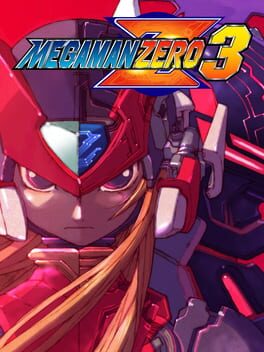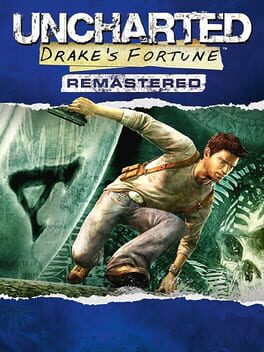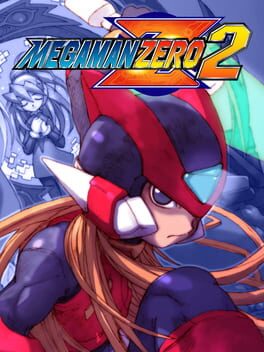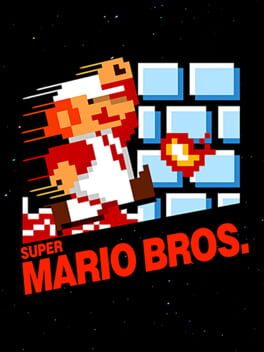Killjoy_Kora
BACKER
2004
This feels like the game Inti Creates was trying to make the whole time. From the massive improvement of the upgrade system, tying upgrades to exploration instead of rank, and the fact that bosses are actually limited to the screen size of the GBA, this makes the best of the Inti Creates Mega Man games so far.
Unlike in the previous two titles (or i’m just stupid) you can now skip dialogue during bossfights, which makes for a massive quality-of-life improvement as the bosses are all more playable. While the story is still far too big for its britches, it is far more enjoyable now that I don’t have to sit through endless and unskippable cutscenes every time I need to try a bossfight again. The upgrade system now having far more customization is also a welcome change.
I don’t know if I will ever replay Zero 3, but I would actually consider it unlike its less-than-average predecessors.
Unlike in the previous two titles (or i’m just stupid) you can now skip dialogue during bossfights, which makes for a massive quality-of-life improvement as the bosses are all more playable. While the story is still far too big for its britches, it is far more enjoyable now that I don’t have to sit through endless and unskippable cutscenes every time I need to try a bossfight again. The upgrade system now having far more customization is also a welcome change.
I don’t know if I will ever replay Zero 3, but I would actually consider it unlike its less-than-average predecessors.
God, I wish I could have just skipped to the sequels. Uncharted 1 is good for what it is, but its strongest aspect is far from the constant, repetitive, and uninspired jungle covershooting. The writing is so stellar, and the main characters are so fun to watch as their banter comes across so natural that it makes me actively resent how boring and repetitive the combat and villains are.
And like holy shit are these villains uninspired and lame. An unironic evil British dude. Like come on. I have much higher expectations for the sequels. Nate, Elana, and Sully are all great though and I’m very excited to see them in a better game.
And like holy shit are these villains uninspired and lame. An unironic evil British dude. Like come on. I have much higher expectations for the sequels. Nate, Elana, and Sully are all great though and I’m very excited to see them in a better game.
2003
Despite my relatively low ranking, I find Mega Man Zero 2 to be a vast step-up from its predecessor. While the first game was highly limited in its ability to produce the difficult to grasp concept of “fun,” the sequel actually attempts to be an enjoyable game–and even partially succeeds. Mega Man Zero 2 has, despite some bizarre design decisions, much more coherent and structured level design alongside a marginally better upgrade system.
However, that upgrade system is limited by the fact that the game only allows you to obtain better weapons and upgraded forms by getting high scores and fulfilling arbitrary achievement requirements on your first try through levels. While I can see the appeal in a challenge based game where replayability is clearly a focus, it is brought down by an exceedingly wordy story that has no love for the time of the player. While I played the (graciously added) save-assist version of Zero 2 via the Legacy Collection, I still found myself infuriated at how long dialogue would play before fights.
I am excited to play Zero 3 next, as that might be the ultimate culmination of a series that’s main inspiration seems to be Mega Man X6 for some reason.
However, that upgrade system is limited by the fact that the game only allows you to obtain better weapons and upgraded forms by getting high scores and fulfilling arbitrary achievement requirements on your first try through levels. While I can see the appeal in a challenge based game where replayability is clearly a focus, it is brought down by an exceedingly wordy story that has no love for the time of the player. While I played the (graciously added) save-assist version of Zero 2 via the Legacy Collection, I still found myself infuriated at how long dialogue would play before fights.
I am excited to play Zero 3 next, as that might be the ultimate culmination of a series that’s main inspiration seems to be Mega Man X6 for some reason.
I really don’t know where to start this one.
On one hand, I have to respect the sheer audacity of 13 Sentinels’s structure, and the brilliant way in which it constantly throws the player between widely differing perspectives. This will be a spoiler-free review, as all of my reviews are. I played 13 Sentinels off the recommendation of a multitude of online games writing individuals who all praised the construction of Vanillaware’s latest release, and let’s say I was not disappointed when I finally got around to opening the game up. However, despite all those well spoken individuals’ opinions, I have never actually seen someone accurately summarize the game’s bold and confusing structure–especially since the game’s introduction/tutorial takes several hours to complete.
13 Sentinels is split between three disparate game modes: the first of which is a simple, side-scrolling adventure game (titles Remembrance) where you play as the titular 13 high schooler protagonists as you attempt to unravel the narrative. Almost every one of the 13 protagonists is a compelling enough character (sans Juro and Iori) who undergoes a radically different experience with time travel. The way this adventure game segment unfolds is mostly just aimless linear wandering until the characters start talking, and while the talking is very interesting, the walking part is a bit uninteresting. The second game mode is the Real Time Strategy component (titles Destruction) (all three of the game modes are accessible at the player’s discretion after completing the introduction), and the RTS game mode is where the main game actually is. Unfortunately, the RTS section takes place after everything in the adventure, so most of the dialogue doesn’t even make sense until you get to the end of the adventure. The third game mode is basically just an in-game encyclopedia documenting everything within the narrative you’ve learned and placing the timeline in a comprehensible order.
This comes to one of my main issues with a game I otherwise really enjoyed, which is how the non-linear storyline affected my ability to actually engage with the narrative. Without the context of Remembrance, Destruction feels very arbitrary and like it doesn’t add anything to the narrative–as the player is only privy to the emotions behind the principal cast insofar as they’ve played Remembrance. Despite this, I found the game’s sheer ambition to be the most compelling aspect of my playthrough, and that is the basis on which I would most recommend it. I was constantly shocked at the twists and turns of the storyline, and despite the underwhelming RTS combat, I found myself completely immersed within the journey of these 13 protagonists, and I will miss their presence.
On one hand, I have to respect the sheer audacity of 13 Sentinels’s structure, and the brilliant way in which it constantly throws the player between widely differing perspectives. This will be a spoiler-free review, as all of my reviews are. I played 13 Sentinels off the recommendation of a multitude of online games writing individuals who all praised the construction of Vanillaware’s latest release, and let’s say I was not disappointed when I finally got around to opening the game up. However, despite all those well spoken individuals’ opinions, I have never actually seen someone accurately summarize the game’s bold and confusing structure–especially since the game’s introduction/tutorial takes several hours to complete.
13 Sentinels is split between three disparate game modes: the first of which is a simple, side-scrolling adventure game (titles Remembrance) where you play as the titular 13 high schooler protagonists as you attempt to unravel the narrative. Almost every one of the 13 protagonists is a compelling enough character (sans Juro and Iori) who undergoes a radically different experience with time travel. The way this adventure game segment unfolds is mostly just aimless linear wandering until the characters start talking, and while the talking is very interesting, the walking part is a bit uninteresting. The second game mode is the Real Time Strategy component (titles Destruction) (all three of the game modes are accessible at the player’s discretion after completing the introduction), and the RTS game mode is where the main game actually is. Unfortunately, the RTS section takes place after everything in the adventure, so most of the dialogue doesn’t even make sense until you get to the end of the adventure. The third game mode is basically just an in-game encyclopedia documenting everything within the narrative you’ve learned and placing the timeline in a comprehensible order.
This comes to one of my main issues with a game I otherwise really enjoyed, which is how the non-linear storyline affected my ability to actually engage with the narrative. Without the context of Remembrance, Destruction feels very arbitrary and like it doesn’t add anything to the narrative–as the player is only privy to the emotions behind the principal cast insofar as they’ve played Remembrance. Despite this, I found the game’s sheer ambition to be the most compelling aspect of my playthrough, and that is the basis on which I would most recommend it. I was constantly shocked at the twists and turns of the storyline, and despite the underwhelming RTS combat, I found myself completely immersed within the journey of these 13 protagonists, and I will miss their presence.
1985
Tears of the Kingdom is an exercise in how much a game developer can get away with in recycling content. Potentially one of the most uninspired Zeldas ever made, TotK retreads everything Breath of the Wild did but worse in almost every way--save for the weapon fusion which is brilliant and I will miss in other titles. From the beginning, TotK kicks you off in a worse version of BotW's tutorial, but longer and less focused. Then it drops you in to the exact same map as the previous game with the only changes being sprinkles of copy-and-pasted content to keep you entertained. Unfortunately, several highlights from the previous game have been completely removed (such as the Guardians) to be replaced with... nothing. TotK as a game seems determined to pretend that it's a vastly more substantive experience than BotW, but fumbles the ball, especially in regards to the new ares: The Sky and The Depths.
The Sky and The Depths are emblematic of everything I dislike about this game (note that I still liked it, I'm just disappointed). The Sky, outside of the tutorial, is barely anything to write home about. A few scattered islands copied across the entire upper level of the map, so sparse as to make one think The Sky exists solely as marketing filler. And The Depths, a whole map the size of Hyrule but covered in absolutely nothing. The Depths, while very cool and frightening when you first discover them, are immediately undercut by how little there is to actually do there. And while TotK benefits from a better sidequest system than its predecessor, it completely fails on making exploration more interesting--or at all interesting.
And outside of the painfully mediocre and repetitive dungeons--all of which feature the exact same "open four locks and fight a boss" structure, lacking personality or any actual difficulty, become the most droll and dull parts of a game that cannot allow itself moderation. TotK is a good game, but not a great one; hampered by a need to reuse its ideas as much as possible, without introducing anything new or interesting, it becomes one of the most lackluster Zelda games I have ever played. I had a solid time, but I wish I had a great time instead.
The Sky and The Depths are emblematic of everything I dislike about this game (note that I still liked it, I'm just disappointed). The Sky, outside of the tutorial, is barely anything to write home about. A few scattered islands copied across the entire upper level of the map, so sparse as to make one think The Sky exists solely as marketing filler. And The Depths, a whole map the size of Hyrule but covered in absolutely nothing. The Depths, while very cool and frightening when you first discover them, are immediately undercut by how little there is to actually do there. And while TotK benefits from a better sidequest system than its predecessor, it completely fails on making exploration more interesting--or at all interesting.
And outside of the painfully mediocre and repetitive dungeons--all of which feature the exact same "open four locks and fight a boss" structure, lacking personality or any actual difficulty, become the most droll and dull parts of a game that cannot allow itself moderation. TotK is a good game, but not a great one; hampered by a need to reuse its ideas as much as possible, without introducing anything new or interesting, it becomes one of the most lackluster Zelda games I have ever played. I had a solid time, but I wish I had a great time instead.





